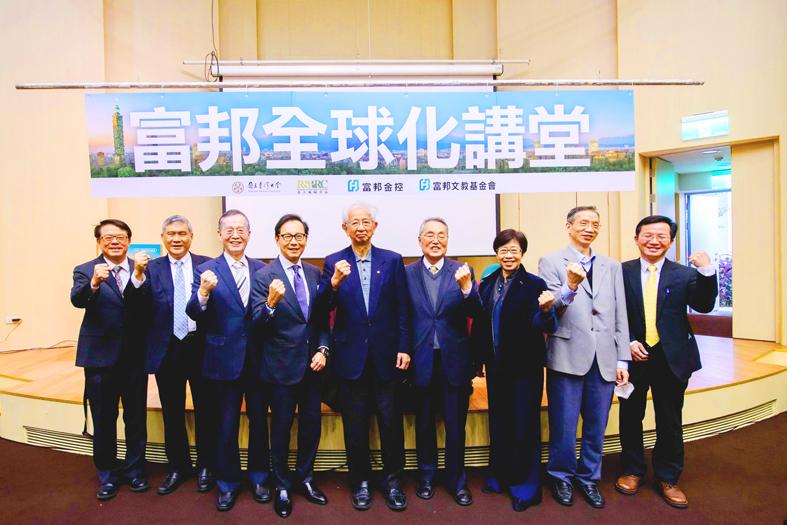Power solutions provider Delta Electronics Inc (台達電) has been charging its business units an internal carbon price of US$300 per tonne this year, as the company aims to incentivize carbon reduction and raise funds for research and development (R&D) of green technology, chairman Yancy Hai (海英俊) told a decarbonization forum in Taipei.
“We all dream of a carbon-
neutral 2050, but it is not enough to boost renewable energy, we also need to curb consumption. At our current level of technology, carbon neutrality at any year is just a dream,” Hai said.

Photo courtesy of Fubon Financial Holding Co
The carbon price of US$300 per tonne is “quite high,” but the scheme is supposed to be “painful” by design, to incentivize carbon savings, he said.
“With the income from the scheme, we can invest in technologies like carbon capture that can be game changers in the future,” he added.
While Taiwan has set an ambitious goal of becoming carbon neutral by 2050, Hai said the rate of change is not fast enough, calling on Taiwanese businesses to go above and beyond to accelerate the rate of decarbonization.
The Taiwan Climate Partnership, which was founded by eight top Taiwanese tech companies — including Delta, Taiwan Semiconductor Manufacturing Co (TSMC, 台積電), Acer Inc (宏碁) and Asustek Computer Inc (華碩) — has the goal of forming a Taiwanese “green supply chain,” Hai said.
Taiwan’s carbon emissions per capita is among the top five in the world, Hai said, adding that he hoped the nation would be able to decouple economic growth from carbon emissions.
To decarbonize Taiwan’s grid, more energy storage would be necessary, and Delta has invested in large containerized storage units, he said.
Speaking at the same forum, Taiwan Institute of Sustainable Energy chairman Eugene Chien (簡又新) said that reaching net-zero must come with curbing power usage, as well as developing green energy.
“No amount of solar panels and wind turbines will help us decarbonize fully without reduction of demand,” Chien said.
“Instead of just talking about supply-side solutions, Taiwan should take a more holistic view and discuss how we can use energy more effectively,” Chien added.

Sweeping policy changes under US Secretary of Health and Human Services Robert F. Kennedy Jr are having a chilling effect on vaccine makers as anti-vaccine rhetoric has turned into concrete changes in inoculation schedules and recommendations, investors and executives said. The administration of US President Donald Trump has in the past year upended vaccine recommendations, with the country last month ending its longstanding guidance that all children receive inoculations against flu, hepatitis A and other diseases. The unprecedented changes have led to diminished vaccine usage, hurt the investment case for some biotechs, and created a drag that would likely dent revenues and

Global semiconductor stocks advanced yesterday, as comments by Nvidia Corp chief executive officer Jensen Huang (黃仁勳) at Davos, Switzerland, helped reinforce investor enthusiasm for artificial intelligence (AI). Samsung Electronics Co gained as much as 5 percent to an all-time high, helping drive South Korea’s benchmark KOSPI above 5,000 for the first time. That came after the Philadelphia Semiconductor Index rose more than 3 percent to a fresh record on Wednesday, with a boost from Nvidia. The gains came amid broad risk-on trade after US President Donald Trump withdrew his threat of tariffs on some European nations over backing for Greenland. Huang further

CULPRITS: Factors that affected the slip included falling global crude oil prices, wait-and-see consumer attitudes due to US tariffs and a different Lunar New Year holiday schedule Taiwan’s retail sales ended a nine-year growth streak last year, slipping 0.2 percent from a year earlier as uncertainty over US tariff policies affected demand for durable goods, data released on Friday by the Ministry of Economic Affairs showed. Last year’s retail sales totaled NT$4.84 trillion (US$153.27 billion), down about NT$9.5 billion, or 0.2 percent, from 2024. Despite the decline, the figure was still the second-highest annual sales total on record. Ministry statistics department deputy head Chen Yu-fang (陳玉芳) said sales of cars, motorcycles and related products, which accounted for 17.4 percent of total retail rales last year, fell NT$68.1 billion, or

Macronix International Co (旺宏), the world’s biggest NOR flash memory supplier, yesterday said it would spend NT$22 billion (US$699.1 million) on capacity expansion this year to increase its production of mid-to-low-density memory chips as the world’s major memorychip suppliers are phasing out the market. The company said its planned capital expenditures are about 11 times higher than the NT$1.8 billion it spent on new facilities and equipment last year. A majority of this year’s outlay would be allocated to step up capacity of multi-level cell (MLC) NAND flash memory chips, which are used in embedded multimedia cards (eMMC), a managed